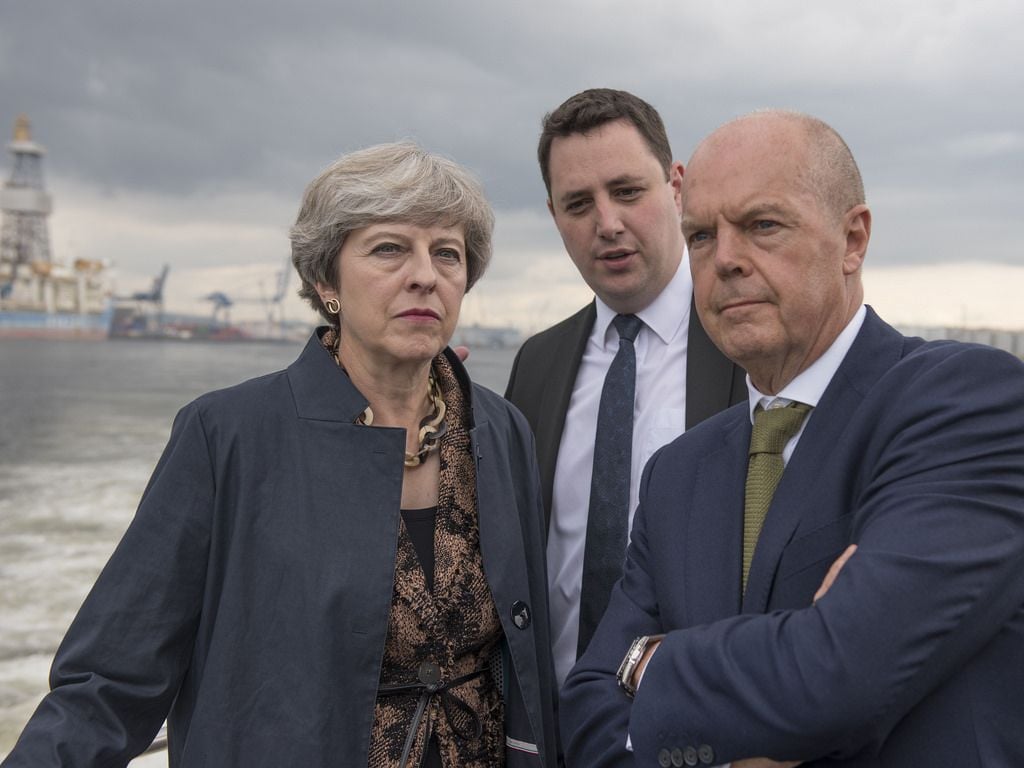May Steps up 'No Deal' Brexit Plans: British Pound Tipped to Remain "on the Back Foot"

Image © Lee Goddard / Number 10 Downing Street
- UK Prime Minister May increases preparations for 'no deal' Brexit
- GBP "will struggle to lift over the short-term" - CBA
- May tells party members EU-UK negotiations are at an impasse
Fresh nerves for the under-fire British Pound on Thursday, August 09 on news reports Prime Minister Theresa May is stepping up the government’s preparations in case Brexit negotiations break down and the country crashes out of the European Union without a deal.
May is planning a top-level meeting of her cabinet ministers early in September specifically to discuss how to ready the U.K. for a no-deal Brexit, according to a Bloomberg report released overnight.
The same report says a separate working group of senior government officials is being convened to ensure the Irish border remains free of customs checks and police even if there’s no withdrawal agreement.
The news confirms the UK is now taking the prospect of a 'no deal' very seriously, even if the official line is the government is confident a deal will be reached.
"Reports suggested the UK side view November as a crucial make or break date and not the October EU‑UK summit. We believe GBP will struggle to lift over the short‑term, reflecting the BoE’s subdued rate expectations and continuing Brexit uncertainty," says Joseph Capurso with Commonwealth Bank of Australia.
Sterling has been under significant pressure over recent days as markets increasingly prepare for a 'no deal' Brexit, with a break of the crucial 1.11 zone in the Pound-to-Euro exchange rate being recorded in midweek trade; something that potentially leaves Sterling at risk of a sudden drop down to the 2017 lows at 1.0746.
The GBP/USD exchange rate meanwhile continues a relentless downtrend that has taken it to 1.2880 for the first time in a year.
"GBP remains on the back foot as PM May is reported to be planning a cabinet meeting in early-September to step up planning for a no-deal Brexit," says Adam Cole, a foreign exchange strategist with RBC Capital Markets.
$EURGBP just broke the 0.90 mark and is now trading at the same level we saw on 19 October 2017. pic.twitter.com/eaGR3ypvSw
— Danske Bank Research (@Danske_Research) August 8, 2018
Whether Sterling heads lower still depends on the nature of the political newsflow over coming weeks.
"With little time to go until March 2019, market focus is now shifting to that ominous Brexit deadline. A cliff-edge Brexit, i.e. no agreement on a transition deal, could seriously hurt Sterling beyond our forecasts. Once again, the GBP is facing the proverbial 'fork in the road,'" says Daniel Trum, a Strategist with UBS.
It is understood that the government now aims to publish 70 documents detailing what will happen to different sectors of the economy if negotiations fall apart.
“Our negotiations on our future relationship have reached an impasse,” May told members of her Conservative party in a letter on Wednesday. She said the two options on offer from the EU - a standard free-trade deal or membership of the customs union plus an extended version of the European Economic Area - are “not acceptable to me, or to the United Kingdom.”
On Sunday, Trade Secretary Liam Fox became the first member of May’s cabinet openly to warn that no deal is now more likely than reaching an agreement with the EU.
The news hit Sterling hard and accelerated the rate at which markets are buying downside protection against further substantial falls in the Pound.
Currently analysts are pricing in only a 25% chance of a 'no deal' Brexit, should this probability be shared by markets and should it increase, we would naturally expect notably more downside exposure for Sterling.
Currency market data reveals the cost of hedging against a 'no deal' Brexit by corporates looking to protect their currency exposure continues to rise relentlessly. Nine-month and one-year contracts have seen relentless demand.
It is these longer-dated options which "truly reflect the rising concern about a no-deal Brexit," says Richard Pace with Thomson Reuters, as these expiries fall after the planned March 29, 2019 Brexit date and therefore capture any related volatility and deeper GBP declines.
And, we are told the British Pound could well fall to an equal value with the Euro should the UK and EU fail to reach a Brexit deal warns a prominent foreign exchange analyst.
The suggestion that the Pound-to-Euro exchange rate could reach a 1:1 exchange rate comes from Jane Foley, Head of FX Strategy at Rabobank in London, at a time when foreign exchange markets are seen to being increasingly factor in the prospect of Brexit negotiations ultimately failing.
"Although it is not our central view, we would anticipate that a hard Brexit would drive EUR/GBP towards parity and this would trigger another round of damaging inflationary pressures in the UK," says Foley.
Meanwhile, domestic politics continue to offer some intrigue with a sense that the Conservative party is increasingly getting behind former Foreign Secretary Boris Johnson with signs he could well win a leadership challenge on incumbent Theresa May.
"After divisive comments earlier in the week, the bookmakers now have Johnson as favourite to be the next PM (ahead of Corbyn for the first time ever and probability up to 14% from 9% last week)," says RBC Capital's Cole.
And what would this mean for the Pound?
"It is unlikely this would be a GBP-positive event," says Cole.
Advertisement
Get up to 5% more foreign exchange for international payments by using a specialist provider to get closer to the real market rate and avoid the gaping spreads charged by your bank when providing currency. Learn more here




